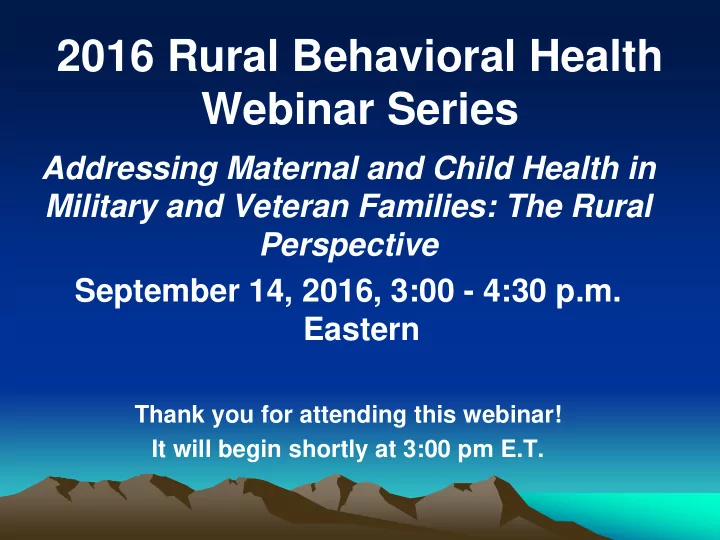

2016 Rural Behavioral Health Webinar Series Addressing Maternal and Child Health in Military and Veteran Families: The Rural Perspective September 14, 2016, 3:00 - 4:30 p.m. Eastern Thank you for attending this webinar! It will begin shortly at 3:00 pm E.T.
Welcome to Today’s Webinar Audio Information: Dial Into: 877-326-2337 Conference ID: 5314165 For Technical Assistance: Dial: 1-866-493-2825 To Submit Questions: Use the Q&A button at the top of your screen
2016 Rural Behavioral Health Webinar Series Addressing Maternal and Child Health in Military and Veteran Families: The Rural Perspective
Presenter Cicely K. Burrows-McElwain LCSW-C, Military and Veteran Affairs Liaison, National Policy Liaison Branch, Division of Regional and National Policy/OPPI, Substance Abuse and Mental Health Services Administration (SAMHSA ) Facilitator Karen Francis, Ph.D., Principal Research, American Institutes for Research
Learning Objectives Participants in today’s webinar will: • Learn about the efforts of SAMHSA to meet the behavioral health needs of military and veterans families (SMVF); • Learn about the importance of effective partnerships and collaborations to provide services to military and veteran families; • Become familiar with strategies for addressing maternal and child health for military and veteran families living in rural communities; and, • To learn about available resources and information from SAMHSA focused on military and veteran families;
Polling Question #1 In what region of the US is your community located? • Northeast/Mid Atlantic • Midwest • South/Southeast • West/Northwest/Mountain • Southwest • Alaska/Hawaii • Territories
Polling Question #2 What is your role in your program/community? • Management/Administration • Clinician/Service Provider • Family/Youth • Community-Based Provider • Federal, State, or Local Policy Maker • Faith-based/Advocacy/Community Coalition/ • Other
Cicely Burrows-McElwain LCSW- SAMHSA’s Military and Veteran Affairs Liaison ADDRESSING MATERNAL AND CHILD HEALTH IN MILITARY AND VETERAN FAMILIES: THE RURAL PERSPECTIVE
Polling Question #3 Do you or your organization screen for military or veteran status/connection? • Yes • No • Don’t Know
Polling Question #4 Do you have a good contact for your local Veterans Administration (state or federal), Veteran Service Organizations (VSO) or other groups in your community that serve SMVF? • Yes • No • Don’t
SAMHSA’s Role in SMVF • Military Families Strategic Initiative (2010-2014); • Executive Order 13625: Interagency Task Force on Military and Veterans Mental Health; • State interagency teams: strengthening SMVF behavioral health systems and community capacity; • Implementation of best practices & building workforce capacity via military culture competency training; • Building peer and grassroots/community capacity.
Key Message Mi Mili litary tary and d civ ivilian ilian in interagency teragency collaboration llaboration is is essential sential fo for r cre reating ating and d sustaining staining strong rong be behavioral havioral health alth systems stems fo for r servi rvice ce me members, mbers, veterans terans and d their eir fa families. milies. • Problems are multifaceted and cross systems; • Integration is essential ; • Primary issue is not lack of services, but effectively using systems and services that currently exists or are being developed.
The role “WE” play • Most healthcare is received outside of the VA; • In fact only 6 of the 20 veteran deaths from suicide daily are receiving care in the VHA system. The behavioral health workforce therefore needs specialized training and education to support SMVF in the community
Model for Community SMVF Readiness
States Involved in Policy Academies(PA’s)
States in Leadership Alabama Alaska Academies (LA) Arizona California Delaware District of Columbia Guam Hawaii Illinois Kentucky Maryland Massachusetts Nebraska Nevada New Hampshire New Mexico New York North Carolina Oklahoma Rhode Island South Dakota Tennessee Texas Virginia Washington West Virginia Wyoming
What we know…
Understanding SMVF • Service members are more likely to be married younger w/ young children at home compared to their civilians; • Largest number of AD children fall between the ages of birth to 5; • Since 2001, more than 2 million American children have had a parent deployed at least once; • Each year approx. 200,000 military members transition out of service; • Rough estimates reflect that 30% of Veterans have dependent children.
Family Impact Protective Factors • Income • Housing • Free medical care • Access to many personal and community services • Sense of meaning/purpose Challenges • Increased stress/deployments/combat exposures • Frequent relocations • Separation from extended family • Fewer community support systems (NG and Reserve)
What we know about rural Veterans • According to VHA, there are 22 million Veterans nationwide, with 5.3 million who live in rural communities. 57% of these rural Veterans are enrolled in the U.S. Department of Veterans Affairs (VA) health care system. • Highest concentration of rural Veterans are in Texas, North Carolina, Ohio, Pennsylvania and New York. www.ruralhealth.va.gov
Community Role in Caring for Military and Veteran Families
Rural Resources/ Tools • http://www.samhsa.gov/smvf-ta-center/about • http://www.mentalhealth.va.gov/communityprovi ders/itf.asp • www.nctsn.org • www.learn@nctsn.org • www.zerotothree.org • http://www.militarykidsconnect.dcoe.mil/ • http://articles.extension.org/pages/62581/military -families-learning-network-webinars
Q & A
2017 Webinar Series Information about the 2017 Rural Behavioral Health Webinar Series will be forthcoming
Don’t forget to visit the Rural Behavioral Health website! http://ruralbehavioralhealth.org
Thank You
Participant Feedback https://www.surveymonkey.com/r/MCHrural
Recommend
More recommend